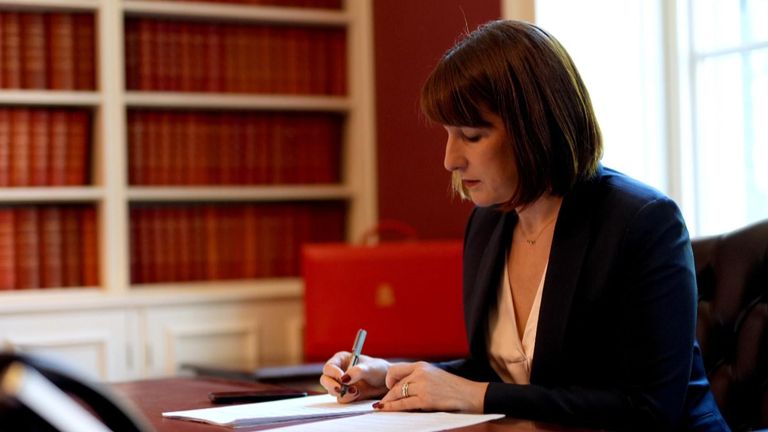Budget 2024: Small businesses call for government to ‘significantly increase’ relief to prevent closures


Small businesses have called for the government to “significantly increase” the employment allowance to prevent them from having to shut down following the budget.
Chancellor Rachel Reeves is set to raise national insurance contributions paid by employers – despite promising not to increase the tax “for working people” – to help fill a £40bn black hole during the Labour government’s budget on Wednesday.
The government has already announced the national living wage, the minimum someone aged 21 and over can be paid, will also increase from April by 6.7% to £12.21 an hour while 16-20 year olds will be paid £10 an hour – a 16.3% rise.
Politics latest: Chancellor’s praise leaves Hunt stunned
Small business owners have told Sky News the combination of high costs over the past few years and the raising of the minimum wage and employers’ national insurance contributions will hit some businesses hard.
Michelle Ovens, founder of Small Business Britain – which champions the UK’s 5.1 million small businesses – warned more and more will fail if they continue to face this kind of pressure without help from the government.
Hospitality is among the industries that will be hardest hit, she said, while a hair salon owner was close to tears as he described how the changes could be “the nail in the coffin” for his industry.
Ms Ovens and Tina McKenzie, policy chair for the Federation of Small Businesses, both called for the government to increase the employment allowance to help relieve pressure and save businesses.
Companies with a national insurance bill of less than £100,000 a year can be exempt from paying the first £5,000 of employers’ national insurance contributions under a programme called the employment allowance.
Advertisement
Increasing the amount small business owners will be exempt from paying national insurance on would help soften the blow, they said.
‘We’ve had enough’
Extending business rates relief would also help small businesses, Ms McKenzie added. The hospitality industry has been given a 75% discount on business rates since 2020, but that is due to end next April.
Toby Vickers, founder of the Salon Employers Association and managing director of The Chapel Salons in London and the South East, said the years of increasing VAT, employers’ national insurance and the minimum wage have made his industry “unsustainable” and the latest changes could be “the final nail in the coffin”.
On the verge of tears, Mr Vickers told Sky News’ Business Live programme: “It means that potentially people are going to lose their homes, and lose their apprenticeships and lose their opportunity to grow because you [the government] haven’t listened.”
“We’re very emotional, we’ve had enough.”
Read more:
Supermarket giants face £200m hit from chancellor’s NI hike
How budget could make things worse for millions
Please use Chrome browser for a more accessible video player

1:20
Business owner on the budget: ‘I am shaking’
‘Small businesses are the lifeboat’
Sanjay Aggarwall, owner of spice tin gift set company Spice Kitchen, in Liverpool, told Sky News the 50% increase in maximum bus fares to £3 has added to the concerns about potential customers having less to spend, as his warehouse team rely on public transport to get to work.
He said he would tell the chancellor: “Small and medium-sized businesses are the lifeboat of this country and employ 61% of the nation’s workforce, so really need to be front and centre in terms of decision making.”

Ms Ovens, from Small Business Britain, told Sky News: “Small businesses have seen high costs across the board over the last few years, so raising the minimum wage again will hit some, though not all, businesses hard.
“Around 16% of small business staff are on minimum wage, and this is concentrated in industries such as hospitality, which will get a double hit from the rise in national insurance too.
“To keep these essential stalwarts of our high streets and communities, we need to see both a rise in employment allowance and a continuation of business rates relief to help with these. If we keep adding pressure to small businesses, we will see a continuation to the growing trend of business failures.
“We hope to see more in the budget to recognise the essential role small businesses play in the economy and growth.”
Ms McKenzie, from the Federation of Small Businesses, said: “Raising employer national insurance contributions at the same time as employers adjust to a higher national living wage is why the government should step up and significantly increase the employment allowance – reducing tax employers pay on wages is how you get sustainable rises staff actually feel in their pockets.”
Sky News has contacted the Treasury for a comment.